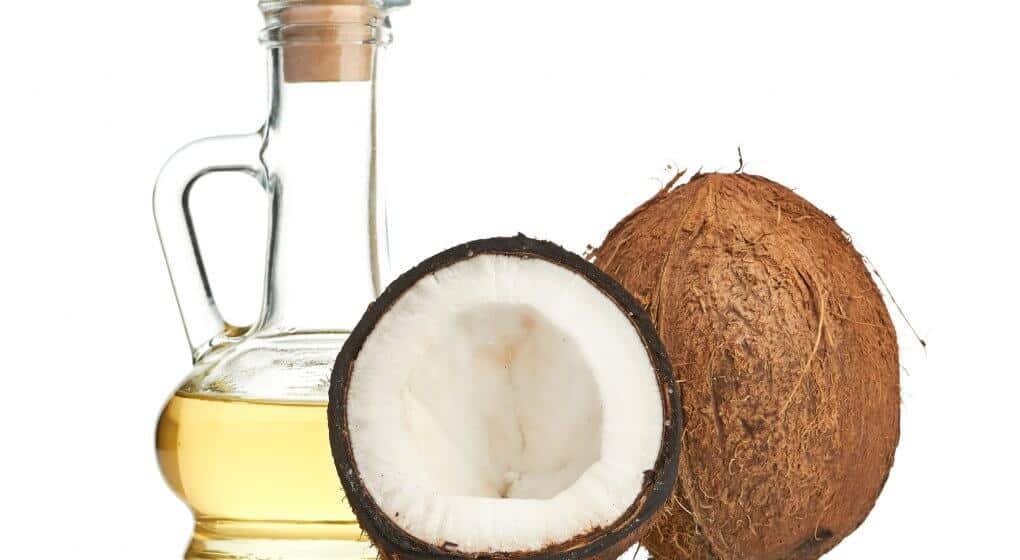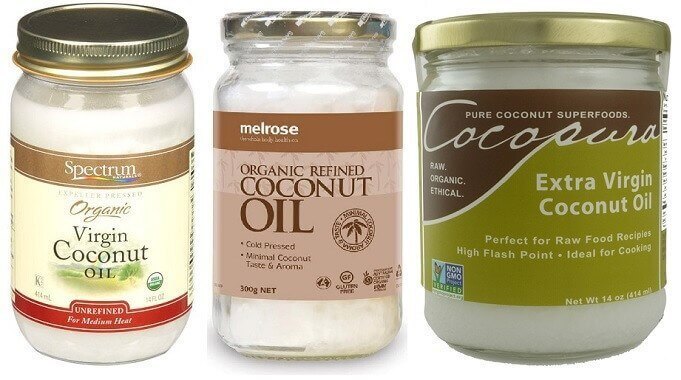
Over the last decade, coconut has become a dietary staple of the health conscious.
Full to the brim with healthy medium-chain fatty acids, coconut oil has been suggested to improve cardiovascular health and function, while simultaneously reducing our risk of developing a vast number of disease and illnesses.
Interestingly, we humans have a rather strong tendency to push the boundaries with the intent of making the something good into something great.
A primary example of this is fractionated coconut oil.
What is Fractionated Coconut Oil?

Fractionated coconut oil is a derivative that is made from some of the components of the original. As its name implies, it is essentially a fraction from which all the long chain fatty acids have been removed, and only the medium-chain fatty acids remain.
If we want to break it down and become a little more specific, once everything has been removed, what is left consists almost entirely of two key medium-chain fatty acids:
- Caprylic Acid (also known as ‘octanoic acid’)
- Capric Acid (also known as ‘decanoic acid’)
While this whole separation process may sound a little bit unnecessary (especially considering the apparent benefits of regular coconut oil), it is important to point out that these specific medium-chain fatty acids (MCFAs) are metabolized slightly differently to other fatty acid molecules.
Once absorbed, MCFAs are transported directly to the liver, where they are either used for energy immediately or broken down into ketones (compounds that have shown some interesting association with improved brain health and function).
This is considerably different from other fatty acid molecules, which are broken down and stored within the body’s adipose tissue (where they can then be used for energy at a later date).
I should also note that in a physical sense, this makes fractionated coconut oil a liquid at room temperature, as opposed to a solid in the original state.
What Are the Benefits of Fractionated Coconut Oil?

So we know that the metabolization is different to its regular counterpart, but is that of any real benefit to us?
In short, yes: there are certainly a few benefits of fractionated coconut oil that are somewhat unique, and therefore not observed with other oils.
Weight Loss

There has been some interesting research to suggest that replacing those regular fats and oils within our normal diet with fractionated coconut oils and MCFAs has the capacity to help promote weight loss.
Interestingly, this phenomenon actually occurs through a number of different mechanisms.
First, the consumption of MCFAs has been shown to significantly lower hunger signals throughout the day. This, in turn, can lead to a subsequent reduction in the amount of energy we consume on a daily basis – which is obviously essential to promoting weight loss over time. [1]
Second, the consumption of MCFAs has also been shown to cause a significant increase in both the amount of fat AND the amount of energy we burn at rest.
This means that after consuming fractionated coconut oil, our body is likely to increase the rate at which it breaks down fats for energy, increasing fat-specific weight loss. [2]
And finally, as MCFAs are broken down and used for energy immediately after consumption, they are not stored as fat within the body. [3] This means that substituting fractionated coconut oil in our normal dies will reduce the amount of energy we physically store as fatty tissue.
The combination of these three primary factors can promote and enhance weight loss in the long term, making fractionated coconut oil in the diet an excellent option for those in need of assistance with weight management.
Insulin Resistance

In conjunction with its impact on weight management, the inclusion of MCFAs into the diet has also been suggested to impact the body’s resistance to insulin (our primary energy storage hormone).
A high insulin resistance is considered a key mechanism behind an inability to manage blood sugar levels, and as such has shown strong associations with diabetes and other metabolic diseases. Interestingly, supplementing with MCFAs has been shown to improve insulin resistance in individuals already diagnosed with diabetes. [4]
This suggests that fractionated coconut oil may have the potential to work in conjunction with more traditional diabetes medication to control blood sugar and improve metabolic health.
Are There Any Negatives?
One of the biggest knocks on fractionated coconut oil is that, although it does contain an abundance of MCFAs, it no longer contains any lauric acid, a compound that is a key component of regular coconut oil.
Lauric acid is a specific type of saturated fat that has been shown to have both antibacterial and anti-fungal properties. As such, its consumption can actually help protect the body against a number of diseases, illnesses, and viral infections. [5]
So, although fractionated coconut oil does indeed have some rather large benefits, it doesn’t actually provide ALL the health benefits that we get from regular coconut oil – which does suggest that the fractioning process may come at a bit of a cost.
Additionally, some individuals have reported side effects associated with the consumption of fractionated coconut oil, even if consumed in smaller doses. These typically present as gastrointestinal distress, and can include stomach cramping, diarrhea, nausea, and vomiting.
As with most things, if you experience any of these symptoms after the consumption, we suggest you consult with a medical professional before continuing your use.
Take-Away Message
Fractionated coconut oil is an interesting supplement that is essentially made by separating the different types of fats from normal coconut oil, leaving only two key medium-chain fatty acids.
Through the interactions of these two key fatty acids with the body, the fractionated version has the capacity to promote weight loss and may aid in the management of diabetes.
It is important to note that although these benefits are unquestionably positive, they do come at the cost (albeit a small one…) of being unable to provide ALL of the health benefits associated with the consumption of regular coconut oil.
Despite this, fractionated coconut oil makes an excellent substitute for traditional fats and oils – particularly in those individuals who suffer from diabetes or those who are trying to promote weight loss.
If you have had ANY experiences with fractionated coconut oil, we would love to hear about them, so drop us a comment below and we will get back to you ASAP.
